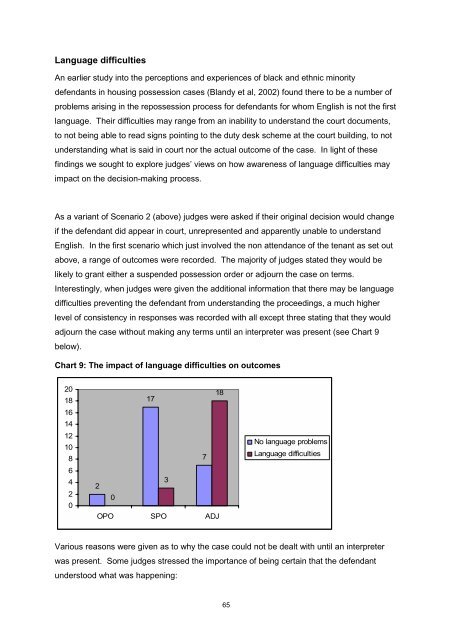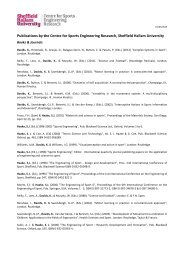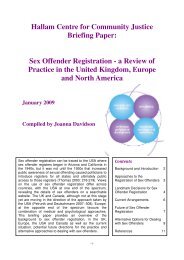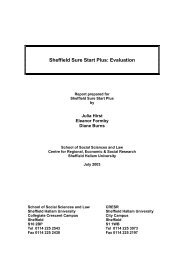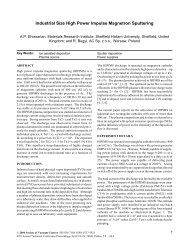The exercise of judicial discretion in rent arrears cases - Sheffield ...
The exercise of judicial discretion in rent arrears cases - Sheffield ...
The exercise of judicial discretion in rent arrears cases - Sheffield ...
Create successful ePaper yourself
Turn your PDF publications into a flip-book with our unique Google optimized e-Paper software.
Language difficulties<br />
An earlier study <strong>in</strong>to the perceptions and experiences <strong>of</strong> black and ethnic m<strong>in</strong>ority<br />
defendants <strong>in</strong> hous<strong>in</strong>g possession <strong>cases</strong> (Blandy et al, 2002) found there to be a number <strong>of</strong><br />
problems aris<strong>in</strong>g <strong>in</strong> the repossession process for defendants for whom English is not the first<br />
language. <strong>The</strong>ir difficulties may range from an <strong>in</strong>ability to understand the court documents,<br />
to not be<strong>in</strong>g able to read signs po<strong>in</strong>t<strong>in</strong>g to the duty desk scheme at the court build<strong>in</strong>g, to not<br />
understand<strong>in</strong>g what is said <strong>in</strong> court nor the actual outcome <strong>of</strong> the case. In light <strong>of</strong> these<br />
f<strong>in</strong>d<strong>in</strong>gs we sought to explore judges’ views on how awareness <strong>of</strong> language difficulties may<br />
impact on the decision-mak<strong>in</strong>g process.<br />
As a variant <strong>of</strong> Scenario 2 (above) judges were asked if their orig<strong>in</strong>al decision would change<br />
if the defendant did appear <strong>in</strong> court, unrepresented and appa<strong>rent</strong>ly unable to understand<br />
English. In the first scenario which just <strong>in</strong>volved the non attendance <strong>of</strong> the tenant as set out<br />
above, a range <strong>of</strong> outcomes were recorded. <strong>The</strong> majority <strong>of</strong> judges stated they would be<br />
likely to grant either a suspended possession order or adjourn the case on terms.<br />
Interest<strong>in</strong>gly, when judges were given the additional <strong>in</strong>formation that there may be language<br />
difficulties prevent<strong>in</strong>g the defendant from understand<strong>in</strong>g the proceed<strong>in</strong>gs, a much higher<br />
level <strong>of</strong> consistency <strong>in</strong> responses was recorded with all except three stat<strong>in</strong>g that they would<br />
adjourn the case without mak<strong>in</strong>g any terms until an <strong>in</strong>terpreter was present (see Chart 9<br />
below).<br />
Chart 9: <strong>The</strong> impact <strong>of</strong> language difficulties on outcomes<br />
20<br />
18<br />
16<br />
14<br />
12<br />
10<br />
8<br />
6<br />
4<br />
2<br />
0<br />
2<br />
0<br />
17<br />
OPO SPO ADJ<br />
3<br />
7<br />
18<br />
65<br />
No language problems<br />
Language difficulties<br />
Various reasons were given as to why the case could not be dealt with until an <strong>in</strong>terpreter<br />
was present. Some judges stressed the importance <strong>of</strong> be<strong>in</strong>g certa<strong>in</strong> that the defendant<br />
understood what was happen<strong>in</strong>g:


